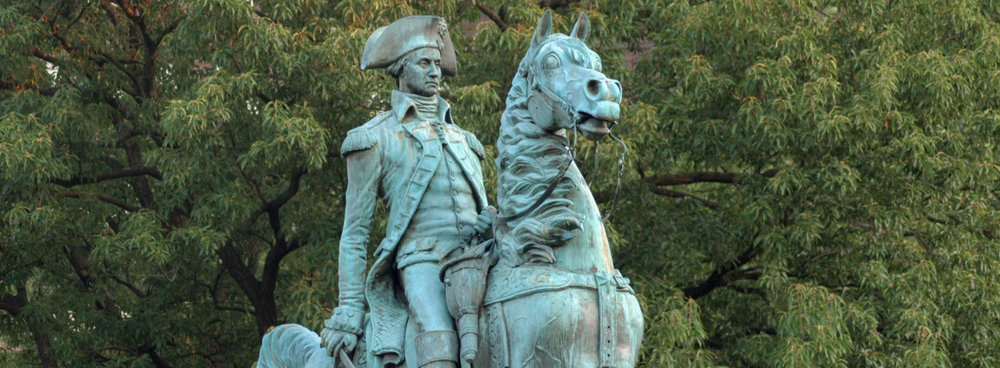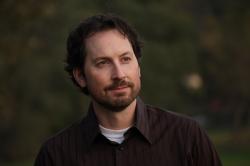Does character in public life still matter? President Biden reflected on this question as he gazed at portraits of America’s great presidents while announcing his decision to withdraw his candidacy from the 2024 presidential race.
Unfortunately, aside from a few vague nods like Americans being “a good people,” the question went largely unanswered, with Biden quickly transitioning to a stump speech for “saving our democracy” by advancing his party’s agenda and endorsing the vice president as his replacement. Like his opponent, who recently showed courage under fire, it was a glimmer of presidential character, but only that. It seems neither party nor its candidates offer a coherent vision for personal character or civic virtue.
But two questions still need answering. Does character still matter? And if so, what does it look like?
Perhaps the most authoritative single source for answers is the first president’s parting speech. Now is a good time to uplift the greatness of presidential character by remembering the virtues lauded by America’s first “indispensable man.”
George Washington’s legacy includes winning the War for American Independence, overseeing the creation of the U.S. Constitution, serving as the first president, and voluntarily giving up power twice. He announced this second decision, now known as his Farewell Address, in a letter published September 19, 1796, in Claypoole’s American Daily Advertisers The address set the standard for subsequent orations by parting presidents and showcased the public service and personal sacrifices of a man who had dedicated his life to safeguarding the new republic.
Washington’s final advice to his countrymen is saturated with references to the virtues necessary for a republic. Unlike the ever-changing, vapid moralism of the internet age, the virtues Washington exemplified and recommended to his countrymen were historic, spanning the classical, Christian, and commercial ages. That these three eras’ highest ideals had informed Washington’s career becomes evident in his address, and a tour through it is a breath of fresh air in this noxious political season.
An Anglican by birth and temperament, Washington had been steeped in Christian literature and liturgy, to which he added classical sources. Washington found the republican statesmen whom Plutarch uplifted particularly inspiring. He appreciated the commercial virtues no less. In the military, he learned the importance of logistics and material provision. As president, he was surrounded by advisers who understood the importance of a robust economy with strong commercial institutions. Alexander Hamilton, a man well-versed in the works of economists like Adam Smith, was Washington’s friend and closest adviser and helped him draft the address.
From the onset of the address, Washington portrays the presidency in moral, not realpolitik, terms. He describes the president as “being clothed with that important trust” to execute the laws of the land faithfully. He acknowledges his own “fallible judgment” and expresses a “debt of gratitude” to the country he had the privilege of serving.
Washington makes several refences to propriety, duty, and patriotism. These words encapsulate the classical virtue of piety, which the ancients understood as the loyalty, honesty, and integrity that flows from an individual’s fulfillment of obligations to the divine, the family, and the community. As the commander who led the armies of the fledgling nation in the War for Independence and then as the statesman who shored up the nascent constitutional order, Washington repeatedly sacrificed his own comfort, safety, and security.
Washington was only able to navigate these tumultuous waters because of another classical virtue he mentions: “prudence,” or wisdom, which means knowledge of the highest goods and the ability to reason, make good judgments, and orient one’s life around these goods. At the end of his second term, the prudent Washington recognized his advancing age and the need for the republic to experience a peaceful transition of power. He trusts that the “free constitution which is the work of your hands may be sacredly maintained” because it is “stamped with wisdom and virtue.”
Washington followed his classical role models’ moderation, a virtue describing the self-discipline that regulates the emotions and prevents statesmen from indulging the excesses of human passion. And in embodying his country’s constitutional values, he also exhibited great-souledness, understood in classical texts as the capacity to exemplify excellence and moral leadership under pressure with a beneficent ease devoid of vanity or selfishness. These virtues helped Washington navigate the squabbling subcommanders and unreliable Congress during the War for Independence, as well as the pitfalls of setting up a new country—including moderating the opposing political views and factions within his own cabinet.
Washington’s nonsectarian Christianity also pervades his Farewell Address. He exhibits the virtue of hope when he invokes and trusts in the protection of “Heaven,” one of his terms for the Christian God he believed had created and ordered the natural world. The constitutional principles that animate the country are “sacred” because they conform with divine law and are safeguarded by the Creator of the cosmos.
Washington’s language in these instances is covenantal, and this national mindset—“the same religion, manners, habits, and political principles” he speaks of—will bind American citizens together in ways that race, blood, or geographical origin never could. America’s sacred, political covenant is the country’s only defense against the factionalism that threatens to tear it apart, which Washington characterizes as originating in the fallenness of human nature. He explains how history has demonstrated that the best way to counter man’s fallen nature is through the distribution of sovereignty and republican checks and balances.
From the republic’s earliest days, Washington feared how party spirit could coopt and corrupt the legal system. Washington warns against the divisiveness seen in today’s candidates—exhorting Americans to frown “upon the first dawning of every attempt to alienate any portion of our country from the rest.” Instead, he stressed “the immense value of your national Union to your collective and individual happiness.”
This is also the essence of the commercial mindset: that individual virtues and happiness are symbiotic with those of the nation, protecting and encouraging one another. Self-interest must not undermine the foundations of unity, the “political fortress” of all, yet the national government must restrain itself, allowing citizens to pursue their individual happiness while also fending off “internal and external enemies.”
Rather than pursuing personal or national glory in foreign wars, Washington recommended temperance and impartial commercial relations. Americans should avoid undue preferential or antagonistic relationships with other countries or even with countrymen of different political persuasions. Impartiality in law, in international affairs, and in political deliberation preserves free republican government. Commercial relations were the sinews of this new republic—tying the north to the south and the east to the west. The unity and mutual benefit of trade between different regions of the country meant “greater strength, greater resource, [and] proportionably greater security from external danger.”
So how can America’s political covenant hold together against the temptations of factionalism? Washington returns to Christianity: “Of all the dispositions and habits which lead to political prosperity,” he exhorts, “religion and morality are indispensable supports.” Statesmen and patriots cannot hope to maintain the United States without “religious obligation” and “religious principle.” How can we conceive of honesty, honor, or justice without the presence of an honest, honorable, and just God behind our aspirations, Washington rhetorically asks midway through his address.
That Washington found no dissonance between the Christian and the commercial virtues is made clear with his natural transition at this point to the other props for liberty and popular government, such as an enlightened education and a strong economy. He had commanded the army and governed the United States with the commercial virtues of thrift, diligence, honesty, and integrity.
He stresses that public and private conduct should be honest, something modern presidential candidates routinely ignore. Washington also recommended thrift in public affairs by “avoiding likewise the accumulations of debt” and not “ungenerously throwing upon posterity the burden which we ourselves ought to bear.” Public debt is something to “cherish” yet use “sparingly.” Americans should cultivate generosity and personal responsibility rather than blame-shifting and passing financial burdens on to our children.
Washington also advised integrity on a national scale. The United States should “cultivate peace and harmony with all,” avoiding foreign alliances that prohibit free trade or compromise objectivity. Americans should be “magnanimous. . . a people always guided by an exalted justice and benevolence.” Alliances divert resources from the industry and innovation that American citizens can dedicate to their own prosperity, a prosperity shared with the world through commerce. Americans should leave foreign powers to their own particular interests and undertake those shifting commercial ties that yield greater benefits to all. Pursuing this economic philosophy of “harmony [and] liberal intercourse with all nations” will make America the greatest nation.
Here the influence of Hamilton, the economic genius behind the Federalist Papers, is keenly sensed. As Samuel Gregg notes:
[Hamilton’s] Federalist 8 hints at a strong parallel between the republican virtues promoted by the Constitution and those of commerce: “a self-governing discipline of enterprise consisting of character traits such as industry, innovation, economy, self-restraint, honesty, prudence, and so on.” The habits which made for commercial success would thus reinforce republican virtues against those habits which threaten republican practice—indolence, hubris, venality, and absence of restraint.
Washington concludes his address with a touching humility. He professes that he took up the presidency only to give the Constitution time “to settle and mature.” This has been accomplished despite his own limitations and defects (no doubt his inability to better combat slavery was on his mind). Washington understood that humans are imperfect creatures with a tendency to wrong one another. Yet he has confidence in the Christian virtue of forgiveness, which is the ability not only to look past wrongdoing but also to restore a damaged relationship or community.
Washington endured personal sufferings, saw good men die for their country, and experienced the pain of severed friendships over political disagreements. His repeated warnings against factionalism also indicate his inability to keep broader factions at bay. Yet he is still confident of America’s future because he is imbued with hope that the United States would become a great commercial republic tempered by the ancient virtues.
This recognition of his own fallibility transitions to an expression of faith in God, whom he prays will not allow his errors to lead his country astray. Washington’s virtue of faith eschews a nihilism or materialism that says there is only earthly power; he instead looks toward the justice and order of the heavens. He believes his republic will continue to find its way as he himself looks forward to God’s perfect kingdom, which the aged statesman describes as the “mansions of rest” now on his horizon.
Washington had opened his Farewell Address to his “friends and fellow-citizens” and offered his advice as a “parting friend.” His conclusion returns to friendship and the virtue of love that inspires it. Washington reflects nostalgically on the “forty-five years of my life dedicated to its service with an upright zeal.” He has offered advice as “an old and affectionate friend” to those who have shared “mutual cares, labors, and dangers.”
As had already become celebrated in Washington’s lifetime, this zeal drove him to great acts of courage from the moment he took the field against the French in the 1750s. He repeatedly came under fire and always maintained his composure, one time saving a doomed expedition from annihilation after his commanding officer was killed. Motivated by the bravado of a young man in these early fights, his motives changed as he grew into a statesman, first in Virginia and then for the United States.
Washington learned to respect the people that made his new country, and especially while sacrificing alongside them in the grueling eight years of the War for Independence. He loves his country, which encapsulates both the “native soil” of Virginia that his family has toiled in for generations and the country that he has served. He will spend his final peaceful days amid “fellow citizens” whom he loves while enjoying the rewards that flow from “good laws under a free government.”
We are unlikely to find statesmen of Washington’s once-in-a-century stature today. Nonetheless, we should expect candidates and citizens to follow his advice and his example of these classical, Christian, and commercial virtues. In fact, if we want a free country worth protecting, we should not settle for anything less.


